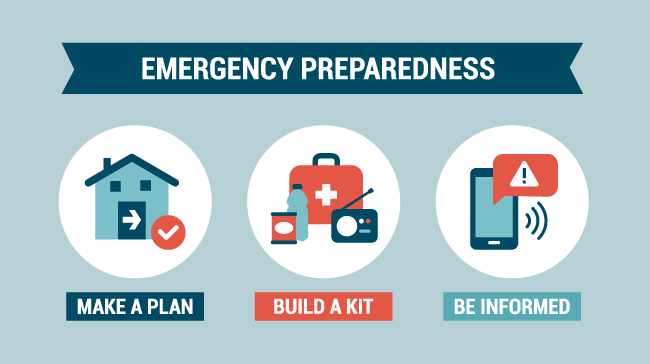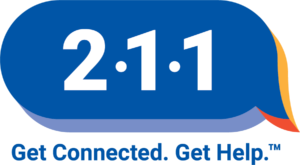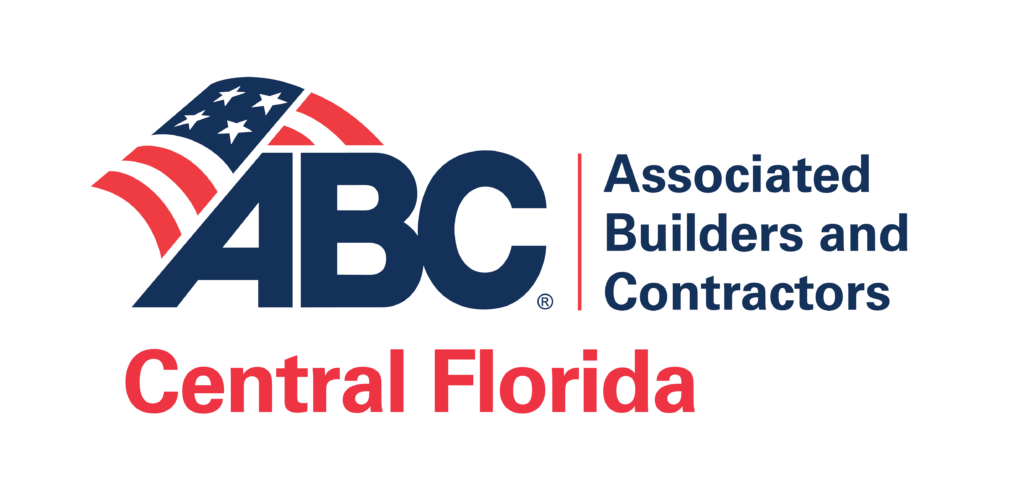Essential Steps for Contractors to Prepare for a Hurricane

1. Pay close attention to evacuation orders:
Pay close attention to evacuation orders issued by local authorities. Ensure that your team members are aware of these orders and know how to safely evacuate if necessary.
2. Stay Informed:
Keeping a close watch on weather forecasts and updates from meteorological agencies is paramount. Advanced warning of a hurricane allows contractors to make informed decisions and initiate preparations well in advance. Utilize weather apps, news outlets, and official sources to track the storm's progress and projected path. See links below.
In preparation of a Hurricane’s arrival to Central Florida, our partner’s United Way has compiled hurricane resources that can help you before, during and after the storm. This page will be updated as information becomes available. Be sure to follow Heart of Florida United Way on Twitter (@HFUW) and Facebook (@HeartofFloridaUnitedWay) for information as well. The 211 Information and Referral hotline, is available by calling 211, texting your zip code to 898211, or chatting online, is available 24/7/365 and our 211 operators are multilingual and can assist you in Spanish.
3. Develop an Emergency Plan:
Create a comprehensive emergency plan that outlines steps to be taken before, during, and after a hurricane. Designate roles and responsibilities for your team members and establish communication channels for quick and effective coordination. Ensure that all team members are familiar with the plan and know how to execute it.
HFUW is Here to Help

Call: 2-1-1 | Text: Your zipcode to 898211 | Chat online here
United Way’s 2-1-1 is Central Florida’s 24/7/365 information and assistance hotline during natural disasters, and throughout the year, for connecting with community resources, like:
- Shelter information and housing assistance
- Sandbags, tarps and other storm supplies
- Evacuation routes and road closures
- Food, clothing and hygiene locations
- Special needs registry and medical supplies
- Emotional and crisis support
To search for resources in your area using our online database, visit www.UW211Help.org.
4. Secure Job Sites:
Hurricane preparedness guide for construction projects
EMERGENCY PREPAREDNESS IN CONSTRUCTION
This checklist is intended to assist you in making your jobsite safe during a hurricane and wind event and limit construction materials becoming windborne debris and possibly causing damage to nearby structures.
1. Site Preparation
- Clean and secure site of loose building materials to minimize flying debris.
- Tie down job trailers and portable structures (including toilets).
- Secure lids of dumpsters and other debris containers.
- Brace new landscaping.
- Remove sand /trash from roadway gutters and drainage systems.
- Secure sediment/erosion control devices to avoid sediment leaving the site during heavy rainfall
- Remove construction vehicles and equipment or move inside.
2. Construction Materials
- Band and stake down plywood lumber, scaffolding, etc.
- All materials inside buildings should be banded together.
- Remove all wood scraps around trailers and site.
- Delay or postpone construction material deliveries.
3. Roofing Materials
- Do not load tile onto roof if it cannot be installed 48 hours prior to predicted landfall.
- Remove and secure roof materials prior to 48 hours prior to predicted landfall.
4. Structural building elements
- Shore up unsupported walls, frame or block.
- Inspect trusses to ensure anchors and hurricane clips are in place.
- Plywood not installed should be removed to the ground.
- Lower tower cranes if possible.
- Inspect tie down on construction and sales trailers.
- Secure any antennas.
5. Windows and glass
- If possible, install panels over windows and sliding glass doors.
- Secure all windows and doors.
An emergency kit includes basic items your household may need in the event of a disaster. Start building your emergency kit here to be prepared for several days after a storm.
Resources Available in Orange, Osceola, & Seminole Counties
Orange County
- FREE Self-Serve Sandbag Sites
- Shelters
- Stay Informed. Click here to sign up for mobile applications and newsletters.
- Sign up for OC Alert – Free alert system that allows Orange County Government to contact you via email or cell phone text message during an emergency affecting Orange County.
Phone: 3-1-1 |407-836-3111Special Needs: 407-836-9319
Website: http://www.orangecountyfl.net/tabid/3761/default.aspxTwitter: @OrangeCoFL | https://twitter.com/OrangeCoFLFacebook: @OrangeCountyFlorida | https://www.facebook.com/OrangeCountyFloridaApps available: https://www.orangecountyfl.net/Home/
NewslettersAlerts.aspx
Osceola County
- FREE Sandbag Locations
- Shelters – stay tuned for openings here.
- Pet friendly shelters
- Stay informed. Click here to sign up for Alert Osceola Emergency notifications.
Phone: 407-742-0000Special Needs: 407-742-9001Website: http://www.osceola.org/agencies-departments/emergency-management/hurricane-center/Twitter: @OsceolaCountyFL | https://twitter.com/osceolacountyflFacebook: @OsceolaCountyFL | https://www.facebook.com/OsceolaCountyFL
Seminole County
Phone: 3-1-1 | 407-665-0311Website: http://www.prepareseminole.orgTwitter: @seminolecounty | https://twitter.com/seminolecountyFacebook: @SeminoleCounty | https://www.facebook.com/SeminoleCounty
Emergency Operation Centers are available in your county, view more info.
5. Back Up Data:
6. Review Insurance Coverage:
7. Build Relationships with Suppliers:
8. Communicate with Clients:
9. Protect Vehicles and Equipment:
10. Stock Up on Essential Supplies:
As part of your emergency plan, stock up on essential supplies such as water, non-perishable food, first aid kits, flashlights, batteries, and communication devices. These supplies are crucial for your team's well-being during and after the hurricane.
Contractors have a significant role to play in disaster response and recovery, especially during hurricanes. By staying informed, having a well-thought-out emergency plan, securing job sites, backing up data, and fostering strong relationships with suppliers and clients, contractors can minimize risks and contribute to effective disaster recovery efforts. Preparedness is key to ensuring the safety of your team, protecting assets, and facilitating a swift recovery after the storm passes.
- Register with Florida's Disaster Contractor's Network
- During times of crisis, ABC of Florida participates on and represents the Commercial Construction Industry on critical private sector business response calls with the Florida Department of Emergency Management and the Executive Office of the Governor. These are beginning tomorrow. We will provide critical updates as we secure them.
After Storm Resources Information
Emergency food pantry locations
Phone: 407-295-1066Website: https://www.feedhopenow.org/site/SPageServer/?pagename=need_food
Red Cross Shelters
Website: http://www.redcross.org/get-help/disaster-relief-and-recovery-services/find-an-open-shelterPhone: 407-894-4141 (local) or 800-733-2767 (Toll Free National)
FEMA Federal Emergency Management Agency
Apply for assistance: https://www.disasterassistance.gov/Phone: 1-800-621-3362Website: https://www.fema.govTwitter: @FEMA | https://twitter.com/fema
Utility Service Provider: Florida Public Service Commission
Program provides an online locator tool for public, private and city utility providers.
Volunteers Needed
Volunteers are needed to staff our state’s shelters and support other disaster relief organizations.
- Heart of Florida United Way – Disaster Response Team. Sign up here.
- Volunteer Florida – Disaster Action Team Responders, Disaster Mental Health Services, and Food Banks. Sign up here.
Disaster Distress Helpline
Provides 24/7, 365-day-a-year crisis counseling and support to people experiencing emotional distress related to natural or human-caused disastersCall or text ‘TalkWithUs’ to 800-985-5990
Florida Hurricane Resources
Florida Disaster State Emergency Response Team (SERT)
Website: https://www.floridadisaster.org/site-index/Phone: 1-800-342-3557Twitter: @FLsert | https://twitter.com/flsertFacebook: @FloridaSERT | https://www.facebook.com/FloridaSERT/ Alerts: Text FLPrepares to 888777 to have alerts sent straight to your phone
FEMA Federal Emergency Management Agency
Phone: 1-800-621-3362Website: https://www.fema.govTwitter: @FEMA | https://twitter.com/fema
Florida Special Needs Registry
Website: https://www.floridadisaster.org/snr/Phone: 800-374-9689Special Needs by County: http://www.floridadisaster.org/disability/specialneeds/
Additional Resources
5-1-1
Contact 5-1-1 for information about traffic and evacuation routes.
Call: 5-1-1Website: https://fl511.comTwitter @fl511_central | http://twitter.com/fl511_centralText alerts: https://fl511.com/PersonalizedServicesApp available
GasBuddy
Check GasBuddy for live updates on fuel availabilityApp: https://www.gasbuddy.com/App
Price Gouging Hotline
Report instances of price gouging on hurricane suppliesPhone: 1-866-966-7226
Ready.Gov
Step-by-step plan on how to prepare from days to hours before a hurricane: https://www.ready.gov/hurricanes


 Emergency Kit
Emergency Kit